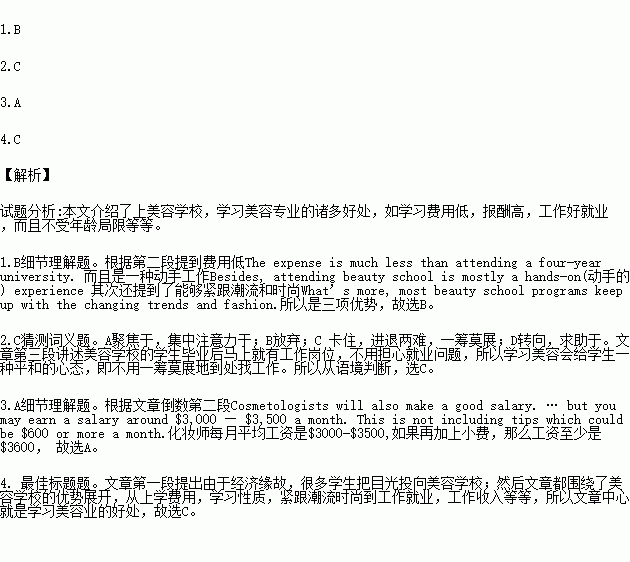题目内容
There are plenty of beauty schools throughout the country that can help you to start a career in cosmetology(美容业). Nowadays, young people may not be able to afford a four-year college. Students can look forward to attending a beauty school program which will only take a few months to complete and start their career right away to earn money.
There can be many benefits of going to beauty school. The expense is much less than attending a four-year university. Besides, attending beauty school is mostly a hands-on(动手的) experience which appeals to many people. Some students don’t like sitting all day listening to lectures and then having to study at night. What’s more, most beauty school programs keep up with the changing trends and fashion. So you will always be working on different hair types which can be fun and will give you a lot of experience throughout the years of your career.
If you are worried about finding a job after graduation, many beauty schools will offer assistance for immediate job placement and give you peace of mind that you will not be stranded looking for a job. Most colleges and universities are not equipped to do that because of the large number of graduates each year.
Cosmetologists will also make a good salary. The average salary will depend on your location, but you may earn a salary around 3,500 a month. This is not including tips which could be $600 or more a month.
Not only can young people go to cosmetology school, but people of all ages can start this career. As you can see, there are many benefits of beauty schools that can be the perfect opportunity for anyone to become a great cosmetologist.
1.How many advantages of going to beauty school are mentioned in Paragraph 2?
A. Two. B. Three. C. Four. D. Five.
2.The underlined word “stranded” in Paragraph 3 can be replaced by ______.
A. focused on B. given up
C. stuck in D. turned to
3.What can be learnt from the passage?
A. A cosmetologist gets paid at least $3,600 a month.
B. Beauty schools are not popular with young people.
C. Graduates can easily be offered jobs by universities.
D. It isn’t suitable for the old to start a career in cosmetology.
4.Which of the following would be the best title for the passage?
A. The development of cosmetology
B. How to become a cosmetologist
C. The benefits of beauty schools
D. Going to college or beauty school
 每日10分钟口算心算速算天天练系列答案
每日10分钟口算心算速算天天练系列答案“中国梦”已经成为一个社会热点话题,根据最近央视的社会调查,不同的人群有不同的梦想。请结合表格提示,用英语写一篇关于“中国梦(Chinese Dream)”的演讲稿在你校将要举行的英语演讲比赛中进行演讲。
不同人群 | 梦想 |
城市居民(Urban residents) | 交通(transportation)…、环境… |
大学生 | 就业(employment)…、食品… |
农民 | 教育…、医疗(medical care)… |
你的梦想 | …… |
注意:
1. 对所给提示逐一陈述, 适当发挥,不要简单翻译。
2. 词数100 左右。开头已经写好, 不计入总词数。
3. 作文中不得提及有关考生个人身份的任何信息,如校名、人名等。
Chinese Dream
“Chinese Dream” has become a hot topic among Chinese people. According to a recent survey by CCTV, different groups of people have different dreams.


